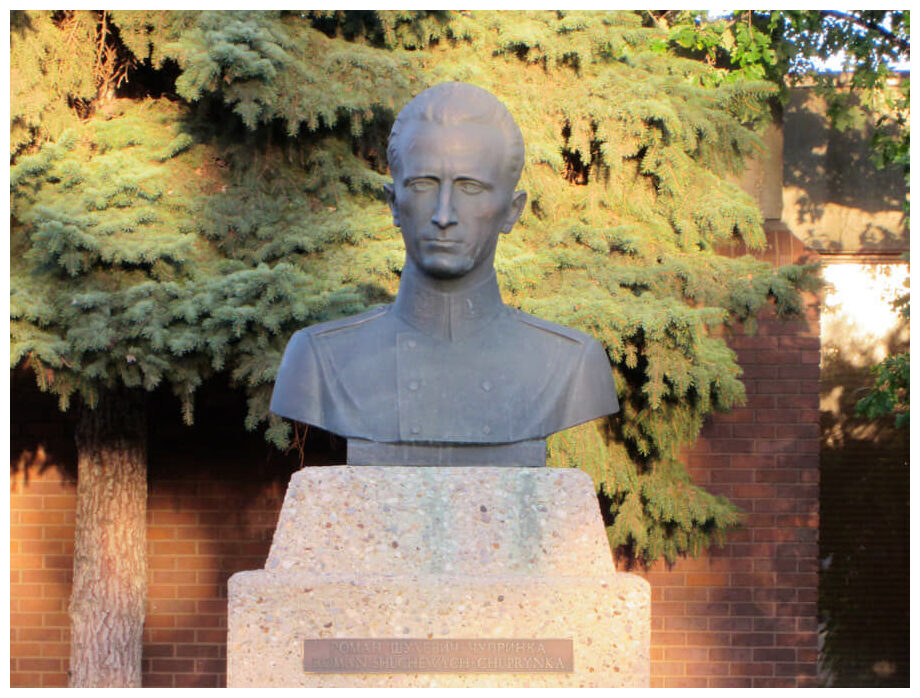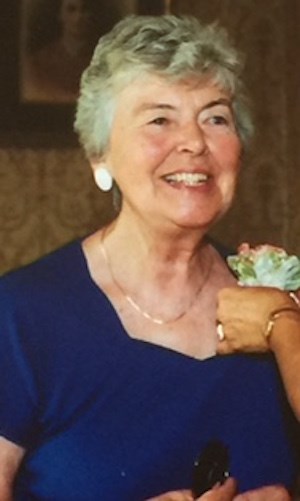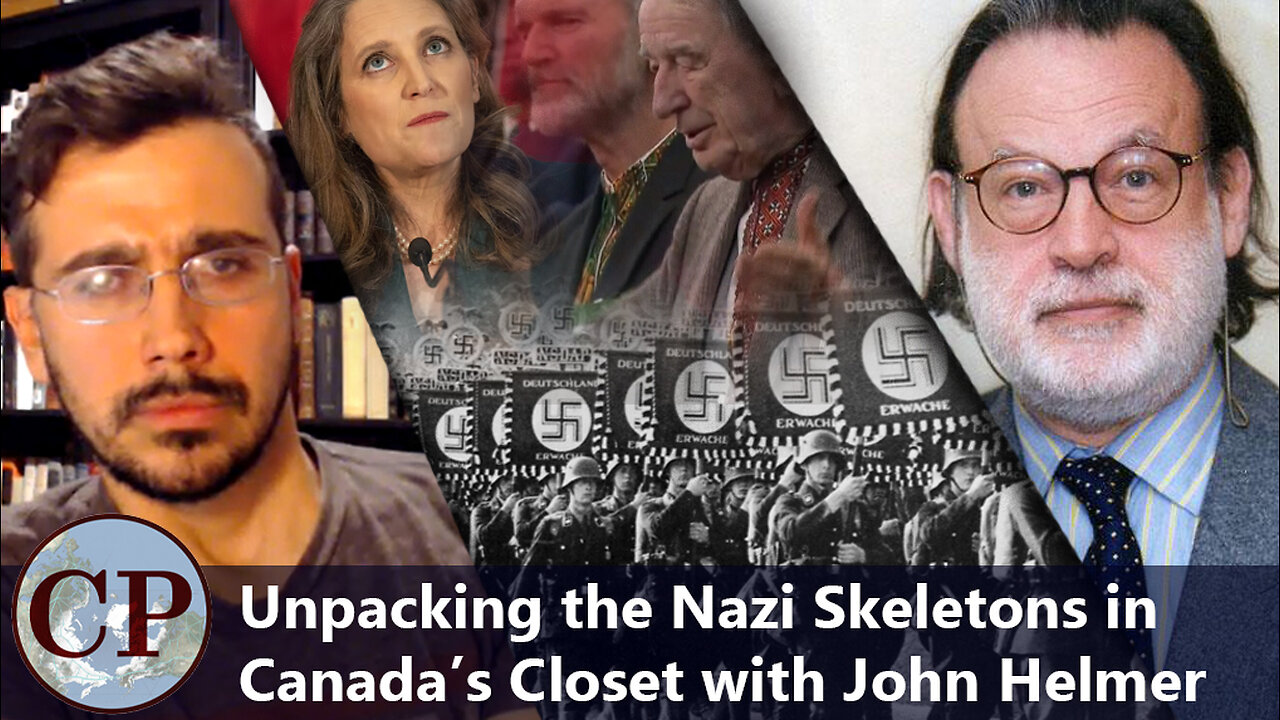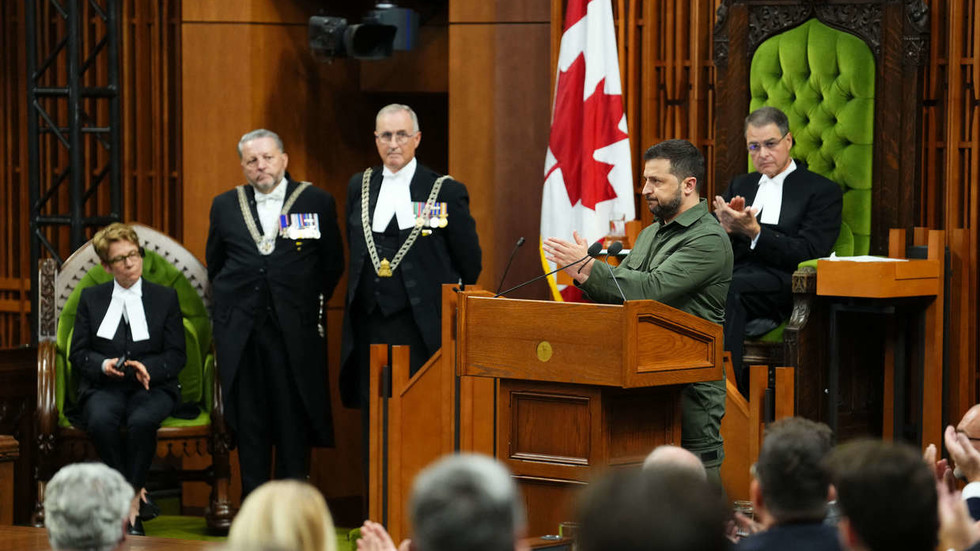Benjamin
The Living Force
I articles, I keep running into a reference of a 60 Minutes episode that exposes Nazis in Canada. It's this one from Feb. 2, 1997 titled 'Canada's Dark Secret'.
In an RT article from Sept. 25, 2023, titled Canada saluting a Ukrainian Nazi was no accident, was links to two articles from in The Jewish News from Northern California in 1997. I have a vague memory of this in the news from then.
And a third one from 2012.
In an RT article from Sept. 25, 2023, titled Canada saluting a Ukrainian Nazi was no accident, was links to two articles from in The Jewish News from Northern California in 1997. I have a vague memory of this in the news from then.
Canada admits letting in 2,000 Ukrainian SS troopers
By Tom Tugend | February 7, 1997
LOS ANGELES — The Canadian government, with British complicity, admitted more than 2,000 members of a notorious Ukrainian Waffen-SS division in 1950, the Simon Wiesenthal Center has charged.
In a related case, the CBS news program "60 Minutes" reported that about 1,000 SS men and Nazi collaborators, mainly from the Baltic states, moved to Canada about the same time.
And the German public broadcasting network reported that 50,000 war criminals receive "victim pensions" from the German government. German sources say 1,882 are Canadian residents.
Almost all the suspected war criminals and collaborators have lived openly under their own names in Canada for 47 years.
The Wiesenthal Center's dean, Rabbi Marvin Hier, and its Canadian representative, Sol Littman, addressed a news conference Monday after meeting with Canadian Solicitor General Herb Gray, who is in charge of the Royal Canadian Mounted Police.
Gray "seemed genuinely disturbed by the material we presented and promised to investigate the charges," Hier said.
Littman, who has been researching Nazis in Canada since 1980, said the 14th Volunteer Waffen-SS Grenadier Division, aka the Galicia Division, largely comprised Ukrainians who served with Nazi police battalions and death squads.
The surviving 9,000 division members surrendered to the British at war's end, and were taken to England.
In 1950, Britain appealed to Commonwealth countries to admit them. Canada agreed to take 2,000, after being assured that their backgrounds had been checked and that they were cleared of complicity in war crimes.
But according to recently released British documents and interviews with officials who conducted the investigations, they were not screened, partly because none of the interrogators spoke their language, Littman said.
The 2,000 settled in major Canadian cities. About half are still alive.
One way of getting into postwar Canada "was by showing the SS tattoo," Canadian historian Irving Abella told "60 Minutes" interviewer Mike Wallace. "This proved that you were an anti-Communist."
He said that longtime Prime Minister Pierre Trudeau once told him his government did not pursue war criminals "because they were afraid of exacerbating relationships between Jews and Eastern European ethnic communities."
But John Sims, the Canadian official in charge of prosecuting war criminals, told "60 Minutes" that this "is going to be an important year, in which…considerable progress will be made in ridding this country of Nazis."
Recent reports of suspected war criminals living openly in Canada follow a November Jerusalem Post series calling Canada a "near-blissful refuge" for Nazis.
Steven Rambam, a New York private detective working with two Post reporters, located about 150 suspected war criminals in Canada, often by looking them up in phone books.
Masquerading as a professor from a fictitious American university, Rambam, a former member of the Jewish Defense League, secretly taped interviews with a former Lithuanian police chief who described in chilling detail his part in the execution of 5,000 Jews.
Meanwhile, the German TV program "Panorama" reported last week that 50,000 war criminals and members of army units who participated in atrocities were receiving monthly bonus pensions, ranging from hundreds to thousands.
The so-called "victim pensions" are added to the pensions of those who suffered World War II-linked disabilities, or to their dependents.
Although a 1950 German law excludes war criminals living abroad from getting such pensions, the law is apparently not enforced in Canada or the United States.
Elan Steinberg, executive director of the World Jewish Congress, has charged that some 3,300 Germans living in the United States receive the pensions.
Canada trying to deport citizen accused as SS guard in Latvia
By J. Correspondent | June 6, 1997
TORONTO — Canada's federal Justice Department has accused Eduards Podins, a 78-year-old resident of British Columbia, of being a former SS guard at the Valmiera concentration camp in Latvia.
The Justice Department is preparing denaturalization and deportation proceedings against Podins that are due to be heard in court this week.
Podins allegedly lied to Canadian immigration officials about his activities in the Latvian auxiliary police from 1941 to 1943.
He has been known to Canadian federal Nazi hunters at least since 1990, when he attempted to enter the United States.
At that time, he was turned back at the border because his name appeared on a computerized "watch list" of about 50,000 suspected war criminals maintained by the U.S. Office of Special Investigations, a branch of the Justice Department that investigates suspected war criminals.
However, despite letters in 1993 from the Canadian branch of the Simon Wiesenthal Center in Toronto, federal officials waited nearly seven years to act against him.
Podins is the 11th alleged Nazi war criminal against whom federal officials have launched denaturalization or deportation proceedings during the past two years.
They have indicated that they intend to name a 12th suspect this month.
The action comes amid growing impatience within the Jewish community at the government's long-standing foot-dragging on the issue.
Simon Zuroff, head of the Wiesenthal Center's Jerusalem office, recently spoke at a community rally in Toronto where some 300 people protested the presence of alleged Nazi war criminals in Canada.
Zuroff noted that one suspect, Antanas Kenstavicius, died before he could be brought to justice.
Kenstavicius was allegedly a member of the 12th Lithuanian Police Battalion, which killed more than 50,000 Jews during World War II. He died in January at the age of 90.
A second suspect on the government's list of suspected war criminals also died before his case could be heard.
Josef Nemsila died at age 83 in April without facing justice for having been an officer in the Hlinka Guard, which slaughtered thousands of Jews and other civilians during the war.
Highlighting the government's recent resolve to bring alleged war criminals in Canada to justice, a federal court in which denaturalization and deportation arguments were being heard against Wasily Bogutin, 88, recessed in Toronto and reconvened in Donetsk, Ukraine, in late May.
Donetsk is a large southeastern Ukrainian city located near Selidovka, where Bogutin allegedly served in the police from 1941 to 1943; during that time he allegedly participated in the execution of a Jewish family and other brutal acts.
The court is expected to hear testimony from 13 Ukrainian witnesses before reconvening in Toronto in September.
As Canadian officials go to greater lengths to gather evidence against alleged Nazi war criminals residing in Canada, some Jewish officials are probing foreign archives to find out how so many people with such dubious reputations managed to slip into Canada with relative ease after the war.
Sol Littman, head of the Canadian branch of the Wiesenthal Center, recently charged that members of the British government willfully deceived Canadian immigration officials in order to get Canada to accept almost 2,000 suspected war criminals in the late 1940s.
Documents that Littman claims to have found in British archives show that officials there were aware that about 12,000 members of the 14th SS Volunteer Grenadier Division then being held in British internment camps had a reputation for brutality.
Although Britain assured Canada that all of these detainees had been investigated for war crimes, no thorough investigation was ever conducted, Littman said.
"They were desperate to get them out of Britain," said Littman.
And a third one from 2012.
Ottawa agrees to revisit case of suspected Nazi war criminal Vladimir Katriuk
Steve Mertl National Affairs Contributor
April 26, 2012
Canada's reputation for hunting down and ousting Nazi war criminals from the country has been spotty.
The government largely ignored their presence until the mid 1980s, according to the Friends of Simon Wiesenthal Centre for Holocaust Studies and when aging Nazis were exposed they often tied up their deportation in the courts for years.
So news that Ottawa was reopening the case of Vladimir Katriuk was welcomed this week by Holocaust survivors, the National Post reports.
A four-member delegation met with Justice Minister Rob Nicholson and Immigration Minister Jason Kenny to urge the government to take action against the Montreal resident after new evidence came to light tying him to a massacre in Eastern Europe during the Second World War.
The group, which included former prisoners of Dachau and Auschwitz, handed the ministers copies of a new academic research paper that described Katriuk's alleged role in the 1943 Khatyn massacre.
"Clearly the research that we presented is new information and I think that they have to analyze it but they have committed to us that they will do so," Wiesenthal Centre president Avi Benlolo told the Post. "They will look at it and they will get the wheels in motion to bring it back to the forefront before it's too late."
Time is running out to bring alleged Nazi war criminals to justice. Like Katriuk, who is 90, they are elderly and have lived most of their lives unmolested since coming to Canada.
Kenny spokeswoman Ana Curic said the government would not comment on specific cases but said it was committed to identifying and removing war criminals from Canada, "including revisiting new evidence on previously examined cases."
Katriuk, who was part of a Waffen-SS unit operating in Belarus, in the former Soviet Union during the war, has lived in Canada since 1951. The Federal Court ruled in 1999 that he lied to obtain Canadian citizenship but the cabinet decided in 2007 not to revoke it, the Post said.
But recently declassified documents used for a paper published in the academic journal Holocaust and Genocide Studies implicated Katriuk in the 1943 massacre of residents of the village of Khatyn, whom the Germans suspected were supporting partisan forces.
"Katriuk's participation in the Khatyn massacre is confirmed by multiple testimonies, and in some detail," the paper's author Per Anders Rudling told the Post.
"The testimonies are consistent in identifying Katriuk as a machine gunner at Khatyn, and indeed in other atrocities. Together, the material produces a compelling evidence that Katriuk was indeed an active participant in the massacre."
Katriuk, who said he was unaware of Rudling's paper, said he testified that he did not join the Waffen-SS battalion voluntarily and that his role was limited to guarding villagers and livestock.
Benlolo said Kenny also committed to revisiting the case of Helmet Oberlander, an ethnic German from the Ukraine accused of being part of a Nazi death squad. The government had his Canadian citizenship revoked but the Federal Court of Appeal struck down the decision.
The Wiesenthal Centre estimates about 2,000 Nazi war criminals lied their way into Canada after the war but were largely ignored until 1985, when the government's Deschenes Commission looked into the question. It recommended changes to the law to make it easier to prosecute or deport suspected war criminals. But since then only a handful of cases have been dealt with.
"There is no joy in seeing these men expelled from Canada, - just the knowledge that we have done something on behalf of those who were killed by these men and hopefully, at last, a sense of justice," Holocaust survivor Max Iland said in a Wiesenthal Centre news release.










